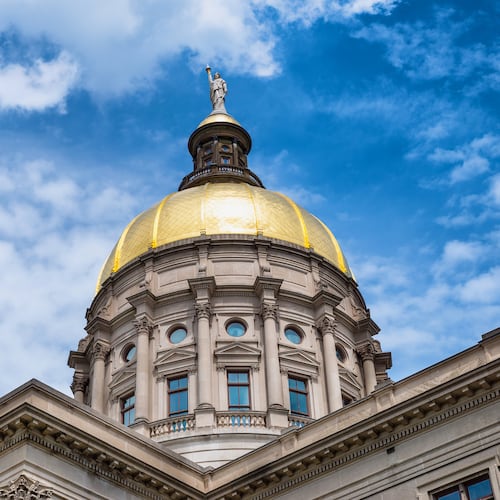Before there was Hyundai’s massive Metaplant in southeast Georgia, Rivian was Gov. Brian Kemp’s signature economic development project.
Now the fate of the $5 billion factory is up in the air — along with Georgia’s reputation as an electric vehicle hub.
Georgia has prided itself on being the tip of the spear for a green energy transformation, attracting tens of billions of dollars in investment that’s created thousands of jobs.
But Kemp has long warned the green jobs boom window for Georgia is narrowing, and Rivian’s announcement that it’s indefinitely halting its mammoth electric vehicle project in Georgia and shifting production of new crossover EVs that would have happened here to Illinois highlighted the industry’s greater struggles.
A slowdown in demand for electric vehicles, increased competition from manufacturers and high interest rates have combined to undercut the once-booming sector.
It’s also a political problem for Kemp, who didn’t immediately comment, and other state leaders who championed the Rivian factory despite staunch grassroots opposition from neighbors of the sprawling northeast Georgia site where the plant would have been built.
Some critics complained they were kept in the dark as authorities negotiated in secret with Rivian, while others vented at the $1.5 billion public incentive package dangled to the carmaker to subsidize the project.
And former U.S. Sen. David Perdue, who launched a failed challenge against Kemp, even vowed to kill the deal if he defeated Kemp — a contrast to generations of lawmakers who have practically pleaded for a new automobile factory after a string of near misses.
U.S. Rep. Mike Collins, a Republican who represents the area in Congress, was among the local officials who signed a petition in 2022 opposing what he called at the time a “disastrous” deal. On Thursday, he sounded a somber note.
“Anytime we can have businesses create good-paying jobs in Georgia and my district, I’m for that, but I’ve always said that government has to be careful when entering the game of picking winners and losers,” he said. “The free market is a marvelous and fair device when allowed to work.”
JoEllen Artz, who lives a mile from the Rivian site and leads a local group opposed to the project, cheered the news that the factory has been paused.
Many in the rural area rely on private wells, and Artz and others have voiced concerns about the plant’s impact on local water supplies. The site sits on top of a significant groundwater recharge area.
”Our water is more important than anybody’s electric vehicle,” Artz said.
If Rivian’s current pause becomes permanent, Artz said she would welcome other businesses to the site — as long as they’re not industrial. She added that local residents must have a seat at the table in any redevelopment discussions.
Cox Enterprises, which owns The Atlanta Journal-Constitution, also owns about a 4% stake in Rivian.
As the news spread around the Statehouse, lawmakers grumbled about what some privately termed a betrayal. Earlier this year, the Legislature overwhelmingly voted to create a new electric vehicle commission to promote the state’s industry and consult on workforce training and infrastructure.
And local and state officials signed off on $125 million for land and training costs, along with tax breaks and other incentives.
“Georgians should have never been forced to hand over hundreds of million of taxpayer dollars and billions in tax incentives to an unproven start up,” U.S. Rep. Marjorie Taylor Greene, R-Rome, said in a post on X, formerly Twitter.
Some lawmakers were already talking about the project in the past tense, even though Rivian chief executive RJ Scaringe said he still plans to move forward at an undetermined date.
“In my community, there’s a 1,800-acre megasite sitting idle, failing to produce promised jobs and promised revenue,” state Rep. Tim Fleming, R-Covington, said on social media. “Georgia taxpayers deserve answers, starting with a clear timeline on Rivian’s strategy to recover from this setback and stronger transparency moving forward.”
-Staff writer Drew Kann contributed to this report.
Keep Reading
The Latest
Featured




